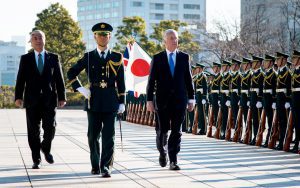 Following the Prime Minister’s visit to Japan last week, Policy Exchange’s Britain in the World project publishes UK Strategy in Asia: Some Starting Principles. The authors David Martin Jones, Visiting Fellow at Policy Exchange and author of Asian Security and the Rise of China, and Professor John Bew, Head of Policy Exchange’s Britain in the World Project advise that:
Following the Prime Minister’s visit to Japan last week, Policy Exchange’s Britain in the World project publishes UK Strategy in Asia: Some Starting Principles. The authors David Martin Jones, Visiting Fellow at Policy Exchange and author of Asian Security and the Rise of China, and Professor John Bew, Head of Policy Exchange’s Britain in the World Project advise that:
- The first principle of UK involvement in Asia must be to bolster existing alliances and to preserve the existing international order on the basis of upholding international law and ensuring freedom of navigation. On this, we have plenty of common ground with Japan, South Korea, Singapore, Australia, New Zealand and the United States.
- A close relationship with the United States remains the foundation of almost every action that the UK takes abroad and this applies in Asia too. It therefore makes sense to coordinate the UK’s actions in Asia around those of the US, much as Japan and other key regional allies do. Crucially, we must avoid stretching American goodwill.
- The next Strategic Defence and Security Review needs to do more to articulate the importance of Asia – and provide some guidance to the challenges and opportunities that greater involvement in this part of the world will bring.
Professor Bew and Professor Jones said:
“Since 1945, at the least, and arguably as far back as 1918, the UK has been the ultimate status quo power – best served by the peaceful preservation of the international system, and the expansion of commerce within it.
“That the Prime Minister’s visit coincided with the firing of a North Korean missile over mainland Japan underscores the fact that Britain cannot dip into the region in pursuit of trade deals without getting more involved in Asia’s most pressing security problems. We must tread lightly, act prudently, and spend our limited capital wisely, rather than hedge our bets and chase paper tigers.
“The alliances that Britain has already – defensive, commercial, bi-lateral and multi-lateral – are its best assets in the region. They are built not only around mercantilist self-interest but shared approaches to trade, open markets, international security and the preservation of the global commons.”

